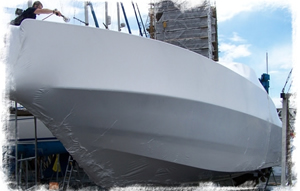 |
| |
First decision
A boaters first decision should be whether or not
they are taking their boat out of the water or
leaving it in. |
| |
Fuel tank
Fill your fuel tank up to capacity along with... |
| |
Engine care
When an engine isn’t used for a long period
of time the oil... |
| |
Antifreeze
You should drain your coolant... |
| |
Your battery
If you're storing your boat outside of the water, take your battery out... |
| |
Clean your boat
Before storing your boat away for the winter... |
| |
Marine Head
Turn off the thru-hull fitting on the head's intake line then... |
| |
Trailer
To protect your trailer's tires you should place the trailer... |
| |
Cover your boat
Whether you plan on storing your boat outside or inside a garage... |
| |
Additional Winterization tasks:
Clean, inspect and grease all... |
|
 |
|
 |
|
|
| First decision |
|
A boaters first decision should be whether or not they are
taking their boat out of the water or leaving it in. Depending
on your location will determine the need to take your boat
out of the water. In the south it is common for a boat to
be in the water the whole year. People in locations in the
upper states almost always store their boats ashore.
If you plan on storing your boat ashore it may be a safer
bet for the life of the boat. Less time in the water means
less deterioration and blisters on your boat’s hull.
Blisters occur when water soaks into the laminate below
the waterline.
If your boat has to be left in the water the thru-hulls
must be protected. This can be accomplished by closing
all seacocks and gate valves. If the thru-hull is left
unprotected during the winter a disaster is likely. Open
seacocks or gate valves left open can cause the sinking
of your boat.
|
| Fuel tank |
|
- Fill your fuel tank up to capacity along with
fuel stabilizer, allowing room for expansion.
- Turn off all fuel valves and seal any through-hull
exhaust ports. This is done in order to eliminate condensation,
which in time will corrode your fuel tank.
- Replace your fuel filter and water filter.
|
| |
|
|
To Top |
| Engine Care |
|
When an engine isn't used for a long period of time the oil settles at the bottom of the engine, leaving the pistons and valves and other parts to the air. To protect your engine from corrosion, remove the spark plugs and spray "fogging oil" inside the carburetor and into the spark plug holes.
Replace your plugs but be sure not to reconnect the wires. This provides a coating to protect the engine parts from deterioration.
The engines old gear oil should be replaced and the lower unit gear case lubricant should be flushed and changed. Don't forget to replace your oil filter. |
| |
|
|
|
| Antifreeze |
|
You should drain your coolant (if applicable) and replace it with a non-toxic,
propylene glycol based antifreeze. Ethylene glycol based antifreeze is known
to release toxins into the water and boaters should try to avoid using ethylene
glycol. Propylene glycol based antifreeze better for the environment and the
majority of manufacturers suggest it's better for your engine.
|
| |
|
|
To Top |
| Your battery |
|
If you're storing your boat outside of the water, take your battery out and store it at home to protect it from the elements of winter. Make sure your battery is fully charged and maintain this charge throughout winter to prevent freezing. Also be sure to fill and renew the water level as needed. If you plan on leaving your boat in the water it's important to leave the battery connected for the bilge pump to operate if necessary. |
| |
|
|
|
| Clean your boat |
|
Before storing your boat away for the winter, you should clean your boat inside and out. You should clean dirt and barnacles because they will be more troublesome when the time comes to launch your boat in the spring. Wash, clean, and wax topsides, bottom, deck, hardware, and trim. Apply a quality Carnuba wax to all chrome and polished stainless steal pieces. Leave the wax on, unpolished until spring (this will create a protective barrier). A dehumidifier or an odor/moisture absorber can prevent mildew from forming inside of a covered boat. Clean your bilges and apply moisture displacing lubricant and some antifreeze to protect them. |
| |
|
|
To Top |
| Marine Head |
|
Turn off the thru-hull fitting on the head's intake line then run the head until all of the water has been pumped into the holding tank. Thoroughly pump the holding tank out with fresh water at least two times. After flushing the holding tank add antifreeze and pump it through the hoses, holding tank, y-valve, macerator, and the discharge hose. Be sure to use a coolant that will not damage your system. |
| |
|
|
|
| Trailer |
|
To protect your trailer's tires you should place the trailer on blocks to relieve
pressure at the same time this prevents your boat from theft You can grease the
bearings of the trailer and replace them if needed Check the trailers tires for
wear
|
| |
|
|
To Top |
| Cover your boat |
|
Whether you plan on storing your boat outside or inside a garage, you should cover your boat. Check out B.I.Q.'s parts and accessories page to find a cover to fit your boat properly. With a proper fitting boat cover it should protect it from mice, pests, bird droppings, rain, snow, and wind.
|
| Additional Winterization tasks: |
|
Clean, inspect and grease all engine control cables Check all drive belts for
any signs of wear, such as riding too far down in the pulleys or any cracking Check
all hoses for bulges, cracks, or limited flexibility and replace if needed Check
clamps on hoses, if they are below the water line they should be double clamped Cover
all engine inlets and exhausts and be sure to remove them during the spring Remove
all electronics from the boat Use a moisture repelling spray on all contact points
and use electrical tape to deep plugs dry
|
| |
|
| |
|
With these important steps your boat should last the winter.
When your ready to launch your vessel in the spring please visit B.I.Q.'s page:
The Spring Checklist |
| |
To Top |


